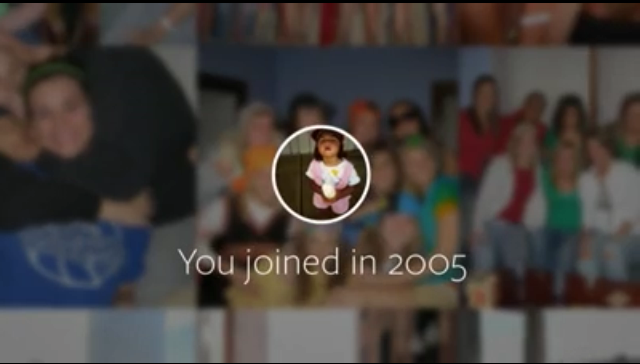Tagged: career planning
4 Ways Talent Management Programs Can Learn From Millennials
If you take a holistic view of the workforce and use a little math, it can be determined that millennials are the closest in age to their childhood. Your 20-somethings within your organization are fresh off the “becoming an adult” train and who knows, maybe some of your 30-somethings are too.
For as much as we millennials love the future and being on the cutting edge of technology, pop culture, and style (for those fashionistas out there) we also love looking back at ourselves, seeing how we grew up and remembering “that one night when…” As technology continues to shape how millennials operate in the workforce it’s also enabling a generation to say, “Remember when…” and track moments in time that would otherwise be overlooked.
Talent Management Programs continue to grow in popularity. When an organization is ready to develop their talent as well as focus on engagement and retention, a TM Program is usually looming overhead. Charts, graphs, feedback outside of the “annual review” from the supervisor, virtual high fives, those are… “Okay,” as Juan Pablo from The Bachelor would say. But if you look at how millennials are tracking their own lives… maybe there’s something to be learned.
1. Timehop: This is an app you connect to all of your social media outlets. Timehop aggregates posts, pictures, Tweets, places you’ve “Checked-In” and tells you what was going on in your life one year ago, two years ago, and three years ago today. Similar to SportsCenter saying “Today in sports history…” We can now say, “Today in my history…” Pretty cool, huh?
2. Spotify: I now have every ‘NSYNC and Backstreet Boys album at my fingertips. Music gets old fast these days. If I have to hear “Blurred Lines” or “Cups” one more time I might give up on the radio. But, the #throwbacks – those stay forever. You want to listen to J. Lo or 2Pac? Maybe even LFO, Third Eye Blind, or Blink 182? Go right on ahead.
3. ‘Look Back’ Videos: For Facebook’s 10th anniversary Facebook users could create a ‘Look Back’ video. A ‘Look Back’ video selected unrelated posts and pictures from people’s profiles, put it to music, and told their 10-year (or less) story in a one-minute snip it. It is a potpourri of your life and brings back sentimental feelings connecting you to your family, friends, milestones in your life, but also the days you were just hanging out watching football with your dog.
4. BuzzFeed Junkies: Who needs news? I could scroll through BuzzFeed all day to remind me of what I loved as a kid and a teen.
- 25 Ways To Tell You’re a Kid of the 90’s
- Which ‘Mighty Ducks’ Character are you?
- This Is Why “Space Jam” Was The Most Ridiculously Epic Part of Your Childhood
- 19 Facts We Learned About “Millennials” in 2013
I know I’ve taken a risk posting these links as those with short attention spans have already clicked and are on to another window but for those who haven’t I will close the blog.
Why is this important in today’s workplace? Think about if you were able to track employees careers like they track their personal life. Wouldn’t it be cool to Timehop that one day you won your biggest account? When you hired your CEO as an intern and now he’s calling the shots? Why not add ways to ‘Look Back’ and show your history, where you came from and where you’re headed?
Incorporating a similar type of platform could remind valuable, top talent why they joined, stayed, and want to continue growing within your organization.
Millennials: Will Work Well In Groups
Myth/Overused Stereotype #146 about Millennials: they are known for collaboration and to be fluid team players. A trait that could be mapped to the current education system consistently promoting group work; so let me get this straight, we currently have a narcissistic generation who also likes to collaborate and work with a team? That seems somewhat unhealthy. Maybe even an oxymoron or more realistically, a group that cannot and will not operate efficiently and effectively.
I’m not quite sure how many “group projects” you’ve worked on, but in my high school and college experience (2003-2011, prime formative GenY years) a group project was met with anxiety, rolled eyes, and immediate over-the-shoulder looking to evaluate if the “worst” person you could potentially work with truly isn’t “that bad,” right?
What caused this change in the education system? Why are we now completing more group projects than in the past? It’s simple mathematics, if I’m a teacher or professor… Do I want to grade 23 papers or 4 papers? Hum… I’ll take 4. And yes, I went to a private liberal arts school and it is possible to have only 23 people in a class. Disclaimer: if any of my business professors are reading this – I truly did enjoy my time and don’t judge me for wanting to get A’s on your group projects. All in a day’s work. I loved my time at Mount.
Now that we’ve discussed one reason why there is a shift to group work, let’s assess how these group projects truly work.
Cast: The Annoying, Control Freak Over-Achiever, Slacker #1, Slacker #2, and Will Follow Orders
The Annoying, Control Freak Over-Achiever reads the assignment and delegates work. Will Follow Orders completes minimal research on Wednesday and sets up a second group meeting on Thursday, the day before the assignment is due. Slacker #2 doesn’t show up to the meeting, Slacker #1 wants to makes sure they get the grade and asks, “So what part of the presentation am I doing?” And The Annoying, Control Freak Over-Achiever has already put together the entire project to be delivered the next day.
If you’re wondering… I may or may not have played the first role of The Annoying, Control Freak Over-Achiever sans Annoying of course.
At the end of the day a class project results in a grade. The Annoying, Control Freak Over-Achiever is only worried about chasing an “A” and truly does not care how he/she gets there. Does this promote great group work? You can be the judge. If you played The Annoying, Control Freak Over-Achiever in school, you despised group work. If you played any other role, you loved group work. Simple.
So when does it make sense to engage in group work at the office?
When Group Work Works for Millennials:
- They’ve had time to ideate alone – groupthink is powerful, I’d argue too powerful to overlook with a group of 20 something’s.
- A clear business challenge or innovative approach will be discussed – chasing a grade is easy, but finding a solution as to why company “x” is spending too much money on base compensation for their sales people has an ambiguous result – we don’t know exactly what we’re chasing and therefore, we have to stretch.
- It comes sparingly – when working in a group it’s a chance to dig out from the “cube life.” If you do something too much it loses meaning. Very similar to praise, don’t just do it because Milennials supposedly “thrive” in that environment. But rather view it as, hey, it’s nice to every once in a while talk to other humans. Even more so when you’re getting paid to actually talk about an innovative approach or solve a problem.
If you’re in GenX or a Baby Boomer, don’t take my word for it or even one of the 808,000 Google results for (“millennials” AND “group work”), ask one of your millennial co-workers about their group projects in high school and college. That will result in some valuable water cooler talk, not to mention hopefully it’s entertaining.
4 GenY Misconceptions About Mentoring
As millennials we’re not only green (aka young, inexperienced, naiive… you get it) when it comes to skill sets needed in a job but the real issue is we’re green to full-time work in general. This creates a perfect storm for 20-somethings and we simply just don’t know what we don’t know.
I currently serve on the board of the Human Resources Association of Central Ohio (HRACO) as the VP of Student Services. My responsibilities include the organization and execution of our mentoring program for college students. Last week I was preparing to speak to students about joining HRACO and I began to think about why GenY might balk at the thought of mentorship.
Misconception #1: Making a decision might be worse than Chipotle running out of steak right before they close and it gives me anxiety.
When individuals say you need to find a mentor, it’s singular. As a 24 year-old millennial, how am I supposed to pick just one mentor? What if I pick the wrong one? What if I don’t think I have the time? What if someone recommends me the wrong person? What if I want two or three mentors? The idea of choosing “My Mentor” is daunting and therefore I refuse to even look into it because of the “what ifs.”
Truth: Getting out of your comfort zone is the best thing you can do. Decisions really aren’t that bad. You can have one or more mentors and if it’s not an “epic” experience, that’s ok. If you pick up just one nugget of information it’s an experience that is moving your forward.
Misconception #2: I’m young, wild, and free like the retro 2011 song says. I have plenty of time.
Three months ago I had my two-year anniversary at work and if you do the math, with a retirement age of 65, I have 41 years left in my career. 41 years? I’ll get a mentor when I’m 30. I can wait.
Truth: So my question would be what happens when you’re 30? Is that when your career jumpstarts? It might be. But, be content with knowing others started at 22 and you’re now 8 years behind. #sorryimnotsorry
Misconception #3: “Older” folks know nothing about technology and that’s what runs the world, please tell me what I can learn from them.
I have a co-worker who has asked me multiple times to help show him how to forward text messages. I tie both hands behind my back, close my eyes, rap “Ice Ice Baby,” hop on one foot and forward the text at the same time, thinking to myself… “For real?” I guess by definition he could be a mentor but he can’t even use his own phone. On to the next one.
Truth: Don’t hate me for this… but you can only learn so much from YouTube. For example, ask YouTube how to merge a PDF. Do not ask YouTube if it can put you in touch with the VP of HR at your dream company. Whether or not a mentor has the latest app has about as much bearing on his/her ability to teach you rapport-building skills, how to build your network, or organizing/prioritizing tasks as the players on a Cleveland roster have on winning a championship. None.
Misconception #4: When I step off the stage at graduation, nothing can stop me from taking over the world.
When I graduated, there was nothing I “couldn’t” do. My parents let me believe if you work hard enough you can get anywhere you want to go. Why would I ask for help? That’s admitting I can’t do it alone and that does not fall in line with my narcissistic ways.
Truth: You’re creating a new marketing plan, you have a meeting to present it to your supervisor tomorrow, and you do it all by your lonesome. All you have as a reference are the three marketing classes you took in college, where you were on Twitter 87% of the lecture and the other 13% of the time you looked up occasionally to make sure the professor was really only using the PowerPoint. In which case you need not pay attention at all, just tally up another “I showed up” in the attendance books and save the studying for the night before your test when you print the PowerPoint and take a quick read-through. How much about marketing do you REALLY know? Maybe someone who’s done this before could give you some tips? Just a thought.
Whether or not you formally call someone a “mentor” is not the issue. What is important is that we seize opportunities to learn from those with experience. It could be a formal program, a meeting with your professor, or lunch with a co-worker.
I’m not trying to crush dreams. Please feel free to be successful. Just know you might need a few others along the way.
Tell Us What Not to Do vs. What We Should Do
Do this. Do that. We Millennials have been told how to act, how to dress, how to speak since we were teens. Whether it’s a millennial thing or a “this happens to every 20 something” thing, the idea of telling these “kids” how to act does not reveal consequences but rather prompts rebellion and raises this question, “Why do I have to do it that way?”
Jeff Havens is a speaker, trainer, and author regularly on Fox Business News and has been featured in Business Week, the Wall Street Journal, CNBC, AOL, and dozens of other regional and national media outlets. I have witnessed Jeff in action at Ohio SHRM and I believe that saying the audience was engaged is an understatement.
Jeff’s speaking engagements, training sessions, and publications use humor in education and inform the audience of WHAT NOT TO DO and WHY. He makes learning about dress code, office and dining etiquette engaging and humorous. Jeff can tell you How to Get Fired, which might help you do the opposite and actually keep your job
Here are a few run on sentence vignettes of my experiences or stories I’ve heard during my almost quarter century of being on this earth describing how those my age have been told what to do.
Number One: There are dress codes at some public schools prohibiting students from wearing sweats basically decreeing, “No, do not wear sweat pants and try to be comfortable because you look like a schmuck and don’t reflect the affluent neighborhood and district we want to depict.” Because being comfortable and showing off your new Miami Heat 2013 NBA Championship hoodie would be a detriment to your experience as a student and is such an awful means of self-expression. Do you know how much more I want to wear that hoodie because of your “dress code”? A LOT.
Except if you know me… I clearly would not select that sports team but I’m trying to be non-bias by selecting a current event while still putting my bias into play so that I am not confused with being a front running sports fan.
Number Two: In college there was an hour of my life I will never get back to use for something much more valuable, such as watching a re-run of Grey’s Anatomy. I majored in Business Administration and rather than higher education teaching Millennials to deal with something such as rejection – we played around on Microsoft Office, learned how to write memos, worked on our resumes once a week to finagle “work experience” onto the page, and what else? Dining etiquette, yes sir or madam it was required for us future business leaders to attend this special session on how to eat and drink. I mean, who wouldn’t be jumping up and down to do that?
One, if you’re really interested in dining etiquette I am almost positive YouTube could do a fairly good job of telling you the salad fork is smaller than the dinner fork and picking up your bowl of soup to slurp the last bit of broth is inappropriate. Two, they TOLD me how I should conduct myself, which led me to ask… So if I happen to forget to turn my coffee cup over at the dinner table but, yet still decline coffee from the waiter/waitress, the person across the table from me will get up and leave?
Number Three: Speak eloquently, slow down, NEVER cross your arms, look me in the eye, and please give me your undivided attention. How many self-help or “business” books talk about how you SHOULD communicate? So what they’re telling me is if I model myself after a polished communicator, I’ll be on my way to success? What if I’m talking to a room of 20 something’s? What if I’m so polished it’s intimidating and I’m uptight and no one can relate to me?
In no way am I saying that I’m an endearing communicator but you can’t tell me that Blake Shelton’s Southern drawl doesn’t captivate you.
These are just three examples of how we are told how to act. But the younger generation entering the workforce might have some trouble with not only being told what to do but the real issue is being told what to do without understanding why. When you describe what not do to do, your why shines through. The why typically being, “I’d prefer to not act like a reckless hooligan.” If you happen to read Jeff’s books, he has a poetic and comedic means of leading you to the promise land of, “I never want to act like that.”
Please understand I do believe you need to be dressed appropriate for your environment, you need to be polite and aware when dining, and you need to understand how to be an effective communicator to your target audience. These are musts in the business environment. But might there a better way of getting this message to Millennials?
HR and Hiring Managers, show the consequence and the hilarity in that consequence. Show what not to do and you might find that the kids (and adults) you’re dealing with might listen this time. It’s not what you say but how you say it. Ask Jeff.
Losing the Top Job—How Romney Lost the Presidency and How NOT to Miss Your Golden Opportunity
I will not begin this blog post by going on a political tirade about who should or should not have won the highest office in the land. So, no worries—this isn’t a political or polarizing post. You may disagree with me, but I can tell you as a bipartisan voter I could not help but notice the parallels between Mitt Romney’s failed run for the Presidency and our own failed attempts at going after “the” job we desire. I have experienced the sting of losing that job I held on such a high pedestal, but fortunately never lost millions in the process. Many pundits and policy wonks will have other ideas of how Romney lost, but here’s my take and how you can avoid the same pitfalls in your own job search.
Failure to Tell Your Story
Everyone loves a story, and if you can capture the imagination you gain interest. And in the case of politics, having a compelling story can take you places. Bill Clinton was the man from Hope, the kid that came from a disadvantaged background, but beat the odds and succeeded. George W. Bush was the black sheep of the family, but fought alcoholism and found faith to help him lead. Barack Obama had dreams of his father and cast a vision of hope for a diverse nation. Mitt Romney undoubtedly has a story, but what story did he tell? Many people knew he was a successful businessman, Governor of Massachusetts, and ran the Salt Lake City Olympics. However, what was his narrative? Besides knowing what was on his resume, what was his personal story?
It is interesting to note that practically anyone with a successful run for the Presidency in the past 15 years wrote a book prior to running for the highest office in the U.S. John McCain wrote Faith of My Fathers that detailed his story as a Vietnam POW. Barack Obama wrote Dreams from My Father that gave a biographical account of his life and that of his parents. Mitt Romney wrote, No Apology: The Case for American Greatness. The book from its description makes a case for the U.S. and for a political platform, but not a person.
As a millennial, the need to start crafting your story now cannot be underestimated. It is important the choices you make in your career, to plan it mindfully. Your choices change the plotline. So, don’t go after any job offer, but ask yourself if this job makes sense as part of the story you want to create for yourself.
Like a politician, you only have a few minutes, perhaps seconds to tell your story when you are on an interview, or on your cover letter. What story are you telling about yourself? It’s the most unique aspect about you. In a sea of resumes it may be your own story that creates a connection with a recruiter or hiring manager.
So, be interesting! When you are faced with situational interview questions think of what stories you can tell and sound interested in yourself when you tell them. Think of your “elevator speech” if you will as the brief description on the back of a book jacket. Would you buy it on Amazon or pick it up from a table at Barnes and Noble?
Beside Every Good Man…
The face of America has changed—and quickly in the past few years. With that, business has also changed drastically, and if it hasn’t, that business can expect to be stifled in its growth. The change—the rising influence and voices of women and minorities.
The Republicans struggled with creating a platform and narrative that women and minorities could connect with and it cost them. The voices of Todd Akin and Richard Mourdock were too near, too backwards, and were not silenced early enough. Mitt Romney did comment on Akin and that his words “hurt the party”. However, it wasn’t enough to eliminate the cloud that fell over the party this election season.
Romney could’ve taken a cue from former Republican President, George W. Bush. One of his top advisors was Karen Hughes. She was influential in helping him relate to women, speaking to issues such as education, and honing the “Compassionate Conservative” image. In trying to Google for “Mitt Romney top advisors women” nothing but websites criticizing his positions on women’s issues come up. The golden opportunity to frame the story was lost because others framed it for him.
Companies that embrace diversity and that are taking the initiative in raising up women and minority leaders are succeeding. These are the companies of today and of the future that will attract millenials looking for organizations that welcome diversity. Millenials are often attracted to companies that are socially responsible, and part of that responsibility comes from embracing diversity. Voices that were once on the fringe of politics and business are becoming increasingly influential.
If you are a millennial, are you looking for a company that embraces diversity? If you are a company in an industry that has been male dominated, what are you doing to actively create a story that is as diverse as America? If you are not doing anything now, start creating that story and read the stories of those people and companies that get it.
Otherwise, expect to begin a losing streak.
Please feel free to contact me regarding any comments @TammyLawlor on Twitter.









